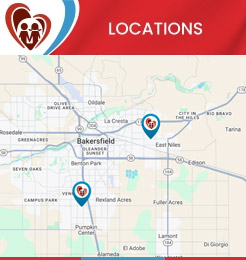Pediatric Immunization Clinic at Niles Children’s Clinic, and Wible Family Medicine in Bakersfield, CA
Pediatric immunization and vaccinations are crucial for children’s health, protecting against serious diseases and preventing illness. Our skilled doctors are committed to providing quality pediatric care. If you are a parent or adult concerned about your child’s health and looking for vaccinations, we recommend you visit our clinic, at Niles Children’s Clinic, and Wible Family Medicine, to determine which immunizations your child requires and when. For more information, contact us or schedule an appointment online. We are conveniently located at Niles Children’s Clinic, and Wible Family Medicine in Bakersfield CA.




Table of Contents:
Why are immunizations and vaccines important?
When should I bring my baby for its first shot?
What is the children’s immunization schedule?
Where can I get my baby immunized?
Immunization is a key method for developing immunity against various diseases. It involves administering small amounts of a weakened or inactivated germ that causes a disease, or fragments of the germ such as proteins or genetic material. The purpose is to prepare the immune system to recognize and fight the disease if exposed in the future.
Vaccines play a crucial role in protecting children from diseases that can cause severe illness, long-term disabilities, and sometimes even death. Before vaccines are used, they undergo extensive testing to ensure they are safe and effective. This is crucial because it guarantees that the benefits of preventing disease outweigh any potential risks from the vaccination itself.
Although most children can safely receive vaccines, some with specific health conditions may not be eligible for certain vaccinations. For those who can be immunized, it is a critical step not only to protect themselves but also to prevent the spread of diseases to others in the community, including friends and loved ones. Immunization helps to avoid outbreaks of diseases that are otherwise preventable.
Unvaccinated children might face exclusions from schools and daycare facilities if they catch a vaccine-preventable disease, which can create logistical and financial challenges for families. Therefore, ensuring that your child receives all recommended vaccines is essential for their well-being and for maintaining a healthy community.
The first doses of most vaccines should be given to your child within the first two years of life. Some vaccines require multiple doses to ensure full protection. The vaccines given are thoroughly tested and approved by health authorities like the Food and Drug Administration (FDA) to ensure they are safe for children.
The Centers for Disease Control and Prevention (CDC) recommends that infants receive vaccinations during their first year to protect against various diseases. These include rotavirus, hepatitis A, Haemophilus influenzae type B, polio, pneumococcal disease, and the combined diphtheria, tetanus, and pertussis vaccine. Early immunization is vital for protecting your baby’s health and development.
The immunization schedule for children starts soon after birth, with the first vaccinations given within the first few months. The schedule is designed to protect infants and children by providing immunity early in life before they are exposed to potentially life-threatening diseases.
Children with chronic health conditions might need additional vaccines to protect against infections that are more dangerous to them than to healthy children. In some cases, the vaccine schedule might be adjusted if a child has an immune system problem, delaying some vaccines or skipping others.
By the age of 15 months, many children will have received up to 10 different types of vaccines, according to the schedule recommended by health professionals. This series of vaccinations plays a crucial role in providing comprehensive protection against various infectious diseases.
You have several options for where to get your baby immunized. Typically, the best place is your pediatric care provider’s office. Pediatricians are familiar with your child’s health history and can provide vaccines during regular check-up appointments.
These appointments are important not just for getting immunization but also for allowing the doctor to perform physical examinations and health screenings. Regular visits to a pediatrician ensure that your child receives comprehensive health care, and they help maintain a consistent record of your child’s health and immunizations.
In summary, immunizations are an essential part of pediatric health care. They protect against serious diseases and contribute to the overall health and safety of the community. Ensuring your child receives all recommended vaccinations on schedule is one of the most effective ways to promote their long-term health and well-being. For more information, contact us or book an appointment online. We are conveniently located at Niles Children’s Clinic, and Wible Family Medicine in Bakersfield CA. We serve patients from Bakersfield CA, Maltha CA, Kayandee CA, Burness CA, Clovis CA, Panama CA, Alameda CA, and surrounding areas.


Additional Services You May Need
▸ Well-Child Visits
▸ Sick Visits
▸ Immunizations
▸ Chronic Disease Management
▸ Newborn Care
▸ Developmental Screenings
▸ School Physicals
▸ Nutritional Counseling
▸ Behavioral Health Support
▸ Hearing and Vision Screenings
▸ Lactation Support
▸ All Services






